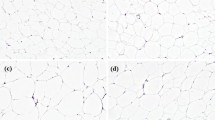Abstract
Objective
The aim of this study was to evaluate, in a mouse model of mevalonate kinase deficiency (MKD), the possible link between inflammatory symptoms and serum cholesterol levels.
Materials and methods
Balb/c mice were treated with alendronate and bacterial muramyl dipeptide. Body temperature, interleukin-1β (IL-1β) secretion and serum cholesterol levels were measured.
Results
An increased production of the pro-inflammatory cytokine IL-1β (p < 0.05) and a rise in body temperature (p < 0.05) was observed, while, in parallel, serum cholesterol concentration significantly decreased (p < 0.05). These effects were completely reversed when animals were treated with exogenous isoprenoids.
Conclusions
In the mouse model of MKD, the inflammatory response is associated with a reduction in cholesterol levels, and hence this parameter could be used as an indicator of isoprenoid consumption. In addition, plant derived isoprenoids could represent candidate treatments for this disease.

Similar content being viewed by others
References
Fears R. The contribution of the cholesterol biosynthetic pathway to intermediary metabolism and cell function. Biochem J. 1981;199:1–7.
Houten SM, Frenkel J, Waterham HR. Isoprenoid biosynthesis in hereditary periodic fever syndromes and inflammation. Cell Mol Life Sci. 2003;60:1118–34.
Frenkel J, Rijkers GT, Mandey SH, Buurman SW, Houten SM, Wanders RJ, et al. Lack of isoprenoid products raises ex vivo interleukin-1beta secretion in hyperimmunoglobulinemia D and periodic fever syndrome. Arthritis Rheum. 2002;46:2794–803.
Houten SM, Wanders RJ, Waterham HR. Biochemical and genetic aspects of mevalonate kinase and its deficiency. Biochim Biophys Acta. 2000;1529:19–32.
Marcuzzi A, Pontillo A, De Leo L, Tommasini A, Decorti G, Not T, et al. Natural isoprenoids are able to reduce inflammation in a mouse model of mevalonate kinase deficiency. Pediatr Res. 2008;64:177–82.
Newsom DM, Bolgos GL, Colby L, Nemzek JA. Comparison of body surface temperature measurement and conventional methods for measuring temperature in the mouse. Contemp Top Lab Anim Sci. 2004;43:13–8.
Mandey SH, Kuijk LM, Frenkel J, Waterham HR. A role for geranylgeranylation in interleukin-1beta secretion. Arthritis Rheum. 2006;54:3690–5.
Hotamisligil GS. Inflammation and metabolic disorders. Nature. 2006;444:860–7.
Acknowledgments
This study was supported by a grant from Institute of Child Health, IRCCS Burlo Garofolo, Trieste, Italy (RC 13/2008).
Author information
Authors and Affiliations
Corresponding author
Additional information
Responsible Editor: L. Li.
Rights and permissions
About this article
Cite this article
Marcuzzi, A., Decorti, G., Pontillo, A. et al. Decreased cholesterol levels reflect a consumption of anti-inflammatory isoprenoids associated with an impaired control of inflammation in a mouse model of mevalonate kinase deficiency. Inflamm. Res. 59, 335–338 (2010). https://doi.org/10.1007/s00011-010-0168-6
Received:
Accepted:
Published:
Issue Date:
DOI: https://doi.org/10.1007/s00011-010-0168-6




